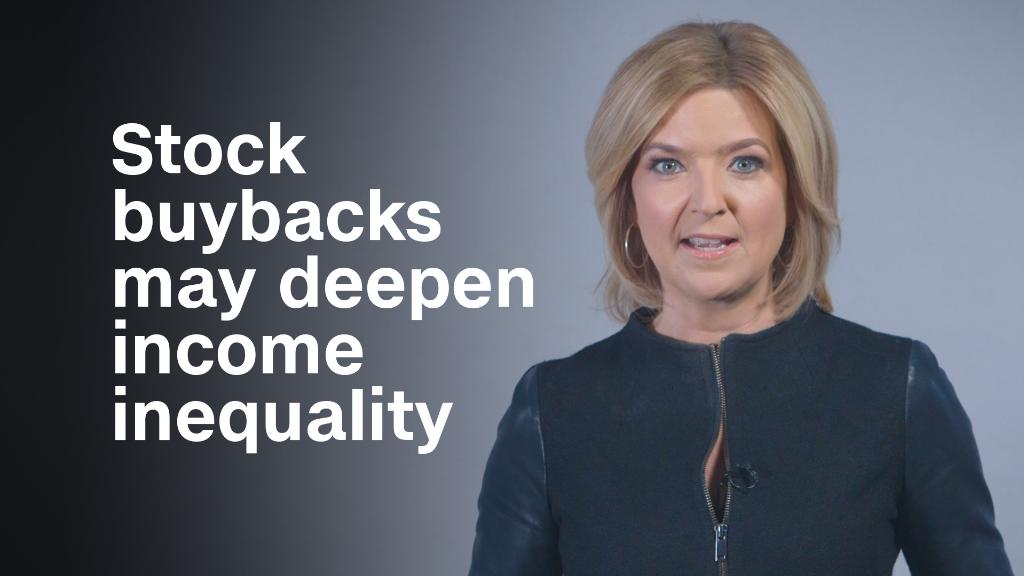
Former vice president Joe Biden is worried about the hollowing out of the middle class, income inequality and the lack of opportunity that Donald Trump tapped into to win the White House — and he has some ideas on how to make things better.
In a speech at Washington-based think tank the Brookings Institution Tuesday, Biden proposed a number of solutions that have been floated by the Democratic party's most progressive members, like offering free college to everyone and banning tactics used by employers to keep workers from being paid higher wages.
But he stopped short of pitching some of the more sweeping proposals emanating from the party's left flank. Instead, he offered up more mainstream ideas, like providing more federal funding for infrastructure projects and making the tax code less friendly to investors while expanding tax credits for low-income families.
Biden is just the latest Democrat to pitch a plan to help close the ever widening income gap. Since the 2016 election, the party's rising stars like Senators Kirsten Gillibrand of New York and Cory Booker of New Jersey, have floated a variety of potential initiatives to address the problem: A universal basic income payment for all Americans, for example, and a government-funded jobs program that would guarantee employment to everyone willing to work.
Related: California ruling puts pressure on gig employers
Biden's language, however, contrasts sharply with the class-war rhetoric of some of his Democratic colleagues.
"I love Bernie, but I'm not Bernie Sanders. I don't think 500 billionaires are the reason why we're in trouble," he said, referring to the Vermont senator and 2016 presidential candidate. "I get into a lot of trouble with my party when I say that wealthy Americans are just as patriotic as poor folks."
Nonetheless, Biden recognized that growing inequality is creating frustration and hopelessness that ultimately undermines American democracy.
"This gap is yawning," he said. "And it's having the effect of pulling us apart. You see the politics of it. And the country's not going to stand for it forever."
While offering only a few details on the mechanics of his proposed solutions, Biden is building out a platform on the middle class on his Biden Foundation web site.
The plan to make higher education free, Biden said, could increase the number of people in college to 9 million. He estimated the measure would cost $6 billion annually, which he said could be paid for by eliminating the "stepped-up basis loophole" that allows heirs to reduce the capital gains taxes they pay on inherited assets.
That proposal appears similar to one offered by President Obama that would have made two years of community college free to all with the help of participating states, at an estimated cost of $61 billion over a decade. Obama had also proposed closing the same tax loophole to fund a number of priorities.
Noting the surprising prevalence of employment contracts that prevent low-wage workers from moving from one job to another, as well as efforts by employers to silence discussion of wages at work, Biden also proposed banning non-compete agreements.
Related: The case for raising the minimum wage keeps getting stronger
"Give me an economic reason why a sandwich maker has to sign a non-compete clause," Biden said. "Tell me, other than to drive down wages, why you're not allowed to tell the man or woman next to you what you make without violating a contract. I call it greed."
Biden's speech was a clear departure from the mainstream conservative solutions for issues like wage stagnation. White House economists say the main problem for poor wage growth is the decade-long slowdown in worker productivity, which they would remedy by encouraging businesses to invest in equipment and technology that could help each worker accomplish more.
Biden pointed to statistics showing that wages stopped growing in tandem with productivity in the late 1970s. He noted that the two measures remain far apart — which means other solutions are necessary to drive wages up.
"The bargain has been broken," Biden said. "Folks in the middle class are in trouble. It's not just their perception."
The impact of automation and technology on jobs, for example, will only deepen that inequality, Biden said, and demands a policy response.
He related a story about a childhood friend whose son became a truck driver and was worried about losing his job in five years when trucks may be able to drive themselves.
"These folks aren't stupid," Biden said. "They listen. They understand. And they're scared to death."


